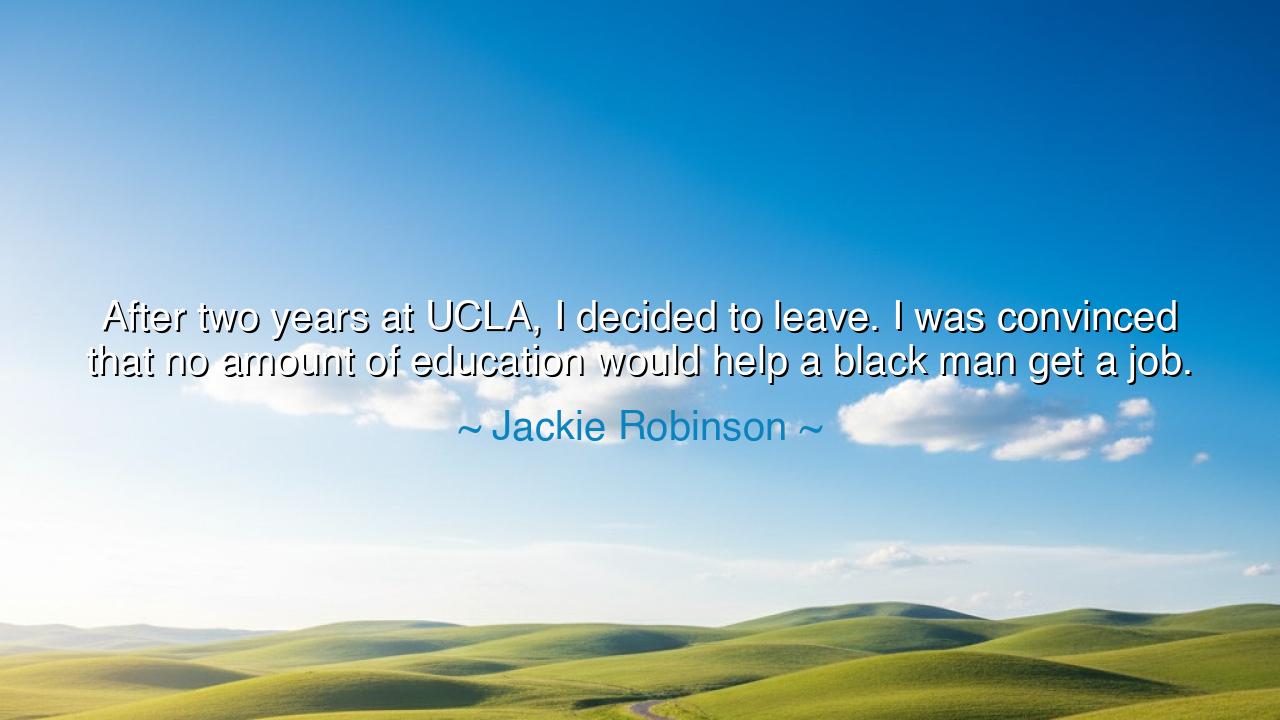
After two years at UCLA, I decided to leave. I was convinced that
After two years at UCLA, I decided to leave. I was convinced that no amount of education would help a black man get a job.






The great trailblazer Jackie Robinson, whose courage changed the course of American history, once said: “After two years at UCLA, I decided to leave. I was convinced that no amount of education would help a Black man get a job.” These words, simple yet searing, speak not only of personal pain but of a deeper truth—a truth about a world where talent and learning were chained by the iron weight of prejudice. Robinson’s lament is not one of defeat, but of revelation. It is the voice of a young man awakening to the cruelty of a society that judged not by the mind’s brilliance, but by the color of the skin.
To understand his words, we must remember the time in which they were spoken. The 1930s were an age of racial division in America, an age when segregation ruled schools, neighborhoods, and hearts. Even at the gates of the university, where education was meant to free the mind, the doors of opportunity remained locked to those whose faces did not fit the image of privilege. Jackie Robinson, born to a sharecropping family in Georgia and raised in the hardship of California’s working class, entered UCLA as one of its few Black students. He was a brilliant athlete, excelling in four sports, and a student of promise. Yet beneath every triumph lay the bitter truth: that in a land of supposed freedom, his color would still dictate his worth.
When Robinson said that “no amount of education” would help him, he was not scorning learning, but exposing the hypocrisy of a world that had separated education from justice. He saw that knowledge, though powerful, could not open doors that racism had bolted shut. For what is the value of study when society refuses to see your humanity? What use is a diploma when prejudice blinds the eye of the employer? In those years, many young Black Americans felt the same despair—that the fruits of their labor would be denied them, no matter how hard they worked or how well they learned. Robinson’s statement was not a rejection of education, but an indictment of a system that betrayed its own ideals.
Yet his story does not end in bitterness. Though he left UCLA, Robinson did not surrender to despair. Instead, he carried with him the lessons that no classroom could teach—the lessons of endurance, of dignity, of self-belief. When he joined the Negro Leagues, and later the Brooklyn Dodgers, he faced hatred far more intense than academic rejection. Crowds jeered him, opponents cursed him, and even teammates doubted him. But through the fire of injustice, Robinson’s education took a higher form—the education of the soul. He learned to master anger without surrendering courage, to fight injustice without losing grace. And when he finally broke the color barrier in Major League Baseball in 1947, he proved that no wall of hate could withstand the power of perseverance.
His life itself became a lesson—a living curriculum in what true education means. For Robinson showed that learning is not confined to the lecture hall or the textbook. It is forged in adversity, refined in suffering, and crowned by character. What the university denied him, life itself bestowed: the wisdom to see beyond the cruelty of his time, and the strength to make that time bow before his will. His triumph was not only athletic—it was moral. He became a teacher to the world, demonstrating that dignity, discipline, and faith are the highest forms of education, and that they can dismantle the mightiest structures of oppression.
There is, too, a warning in his words. For even in our age, when schools have opened and laws have changed, the shadow of inequality still lingers. Opportunity remains uneven, and talent too often goes unseen behind the veil of poverty or prejudice. Robinson’s early disillusionment reminds us that education must never exist apart from justice. It must be more than the transmission of facts—it must be the creation of fairness, the empowerment of every soul to rise. A society that educates but does not liberate, that teaches but does not uplift, repeats the very failure that once drove a young man from UCLA into doubt.
The lesson, then, is both solemn and hopeful. Education, to be worthy of its name, must not only open minds but open doors. It must strive to make opportunity equal for all who seek it. Let us remember Jackie Robinson’s pain not as despair, but as prophecy—a call to ensure that no one else must choose between learning and dignity. Let teachers teach not only knowledge, but empathy; let institutions be measured not only by prestige, but by their power to include. For when education and justice walk hand in hand, the world itself becomes a classroom, and every student a bearer of freedom.
So let Robinson’s words echo through the ages—as a warning, as a challenge, and as a guide. He once believed that education could not save him, but in truth, his life saved education—by teaching it to mean something greater. He showed that knowledge without equality is empty, and that equality without perseverance is impossible. In his courage, we see the truest form of learning: the lesson that even when the world denies you, you must never deny yourself. For the heart that holds on to hope is already free—and that freedom is the highest education of all.






AAdministratorAdministrator
Welcome, honored guests. Please leave a comment, we will respond soon